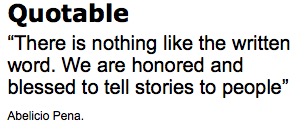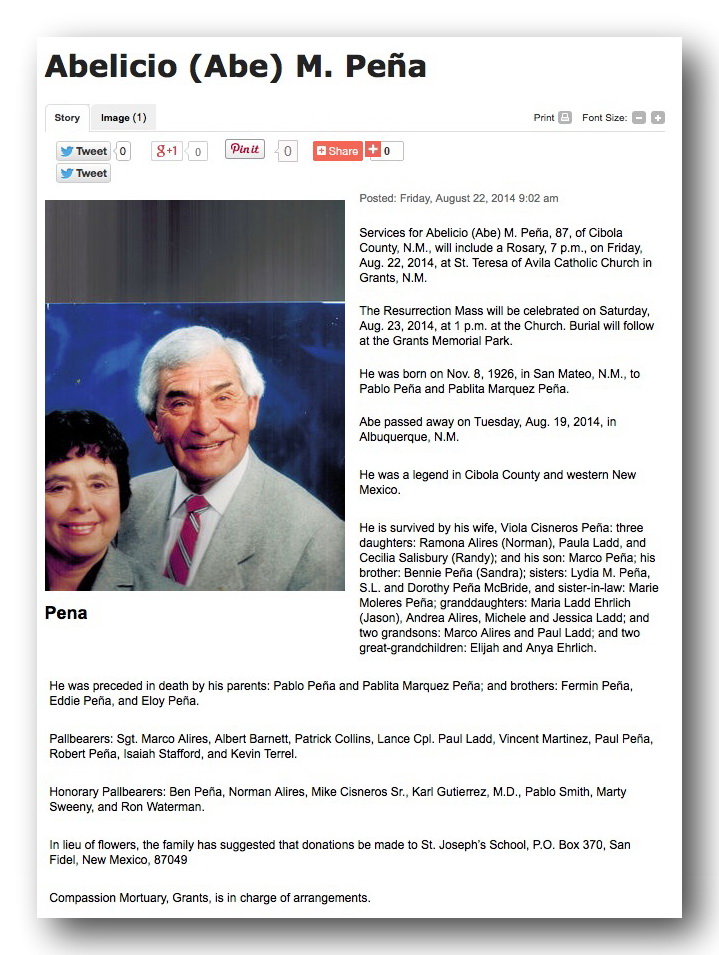 |
Cibola County, New Mexico
|
 |
NMGenWeb Project |
| An official USGenWeb Project site Dedicated to Free Information for Home Family Genealogy use only. |
Excerpts from Abe Peña's
popular publications All material used with the kind permission of the author, given to me personally. |
 Abelicio (Abe) Marquez Peña was born November 8, 1926 in San Mateo, New Mexico to Pablo and Pablita Peña. A sheep and cattle ranching family, thePeñas lived and worked in the small Hispanic village of San Mateo, near Mount Taylor and the Cíbola National Forest. Abe Peña and his six brothers and sisters spoke Spanish at home and didn't begin to learn English until they attended school. Peña attended elementary school in San Mateo and high school in nearby Grants, graduating from Grants Union High School in 1944. He attended New Mexico College of Agriculture and Mechanical Arts (now New Mexico State University) in Las Cruces, graduating with a BS in Animal Husbandry in 1949. After graduation, he became foreman of sheep operations at the Hartsell Ranch, Hartsell, Colorado. Peña joined the U. S. Army in 1950, during the Korean War, and became part of the Meat Inspection Service in the Veterinary Corps, inspecting meat, eggs, and poultry in Chicago and Kansas City. In 1953, he received a Fulbright Scholarship to the University of Technology, Sydney, Australia, where he spent one year studying sheep and wool production. Upon his return to New Mexico in 1954, Peña became foreman of the Frank A. Hubbell Co. ranch, then the largest sheep ranch in the state, in Quemado, New Mexico.
Abelicio (Abe) Marquez Peña was born November 8, 1926 in San Mateo, New Mexico to Pablo and Pablita Peña. A sheep and cattle ranching family, thePeñas lived and worked in the small Hispanic village of San Mateo, near Mount Taylor and the Cíbola National Forest. Abe Peña and his six brothers and sisters spoke Spanish at home and didn't begin to learn English until they attended school. Peña attended elementary school in San Mateo and high school in nearby Grants, graduating from Grants Union High School in 1944. He attended New Mexico College of Agriculture and Mechanical Arts (now New Mexico State University) in Las Cruces, graduating with a BS in Animal Husbandry in 1949. After graduation, he became foreman of sheep operations at the Hartsell Ranch, Hartsell, Colorado. Peña joined the U. S. Army in 1950, during the Korean War, and became part of the Meat Inspection Service in the Veterinary Corps, inspecting meat, eggs, and poultry in Chicago and Kansas City. In 1953, he received a Fulbright Scholarship to the University of Technology, Sydney, Australia, where he spent one year studying sheep and wool production. Upon his return to New Mexico in 1954, Peña became foreman of the Frank A. Hubbell Co. ranch, then the largest sheep ranch in the state, in Quemado, New Mexico.
In 1955, Mr. Peña married Viola Ruth Cisneros of Santa Fe, New Mexico, a music teacher and a graduate of the College of Mount Saint Joseph on the Ohio. The couple started a family that would grow to three daughters and one son. Peña returned to his family's ranch in San Mateo and became part owner and operator in 1957, and his family remained there until 1972. During these years, he became involved in several civic and professional organizations, such as the Western Valencia Stockman Association [Cíbola County was formed from Valencia County in 1981], the Agricultural Stabilization and Conservation Service, Grants-West Valencia County Chamber of Commerce, New Mexico Wool Growers Association, Uranium City Toastmasters Club, Los Lunas Hospital and Training School, New Mexico Cattle Growers Association, New Mexico Livestock Board, and Valencia County Farm Bureau, among others. He held executive and board positions in most of these organizations.
Beginning in the late 1950s, Peña became an active member of the Republican Party of New Mexico and served as vice-chairman of the state party from 1969 to 1972. He ran for the State Legislature as Representative from Valencia County in 1962 and 1964, and for the State Senate in 1966, although he was narrowly defeated in all races. He remained an active supporter of the Republican Party throughout his career.
Peña accepted an appointment as country director of the Peace Corps in Honduras in 1972, beginning a 12-year career in the United States Foreign Services. After serving two years in Honduras, he became country director for the Peace Corps in Costa Rica. In these positions, he supervised all Peace Corps-related activities, managing resources, volunteers, staff, and budgets to assist in the agricultural and economic development of the countries. In 1976, he accepted a position as mission director of the United States Agency for International Development (USAID) in Paraguay. In 1979, he was offered and accepted the position of mission director for USAID in politically troubled Bolivia. After a violent military coup in 1980, the U. S. government withdrew its ambassador from Bolivia and recalled Peña to Washington, D. C. as well, in order to demonstrate displeasure with the turn of events in that country. After spending nearly a year traveling across the U. S. recruiting for the Foreign Service, Peña once again was assigned the post of mission director in Paraguay, this time to phase out the mission because Paraguay's status had changed from developing to developed country. He held this position from 1981 until his retirement from the Foreign Service in 1984.
Peña returned to Grants, New Mexico in 1984, where he once again became involved in the family's ranching business, now incorporated as the P. & P. Peña Ranch, Inc. He continued to play a role in local, state, and national affairs, serving as race director for the Mount Taylor Winter Quadrathlon 1987 - 1989, instructor in the Elder Hostel program 1987 - 2000, chairman of the Rio Grande Historical Collections, New Mexico State University Library 1994 - 1995, and board member of the National Hispanic Cultural Center of New Mexico 1998 - 2001. In 1987, Peña began writing a column for the Grants Beacon (now the Cíbola County Beacon) in which he concentrated on local history, traditions, and people. The popular columns were collected and expanded into the book Memories of Cíbola, published by the University of New Mexico Press in 1997. Peña also hosted a locally-produced public access television program throughout the 1990s called Enchanting New Mexico, in which he interviewed local personalities and highlighted local history and cultural attractions. In 2004, he started a history program with KDSK-FM radio in Grants called "Memories of Cíbola" to provide historical information and encourage economic development in the area.
Peña co-founded the Grants chapter of the American Association of Retired Persons in 1987. He served the AARP as State Legislative Committee Chairman 1992 - 1993, National Legislative Council Member 1993 - 1996, and Secretary/Historian of the National Board of Directors 1996 - 1998. During this time, he advocated issues of importance to all senior citizens as well as championing the cause of Hispanic seniors.
Among Peña's many awards and honors are Citizen of the Year (shared with his wife, Viola), Grants/Cíbola County Chamber of Commerce, 1995; Outstanding Centennial Alumnus, New Mexico State University, 1987; Honorary Doctorate, New Mexico State University, 1978; Superior Honor Award, United States Department of State, 1977; and Conservationist of the Year, 1968.
